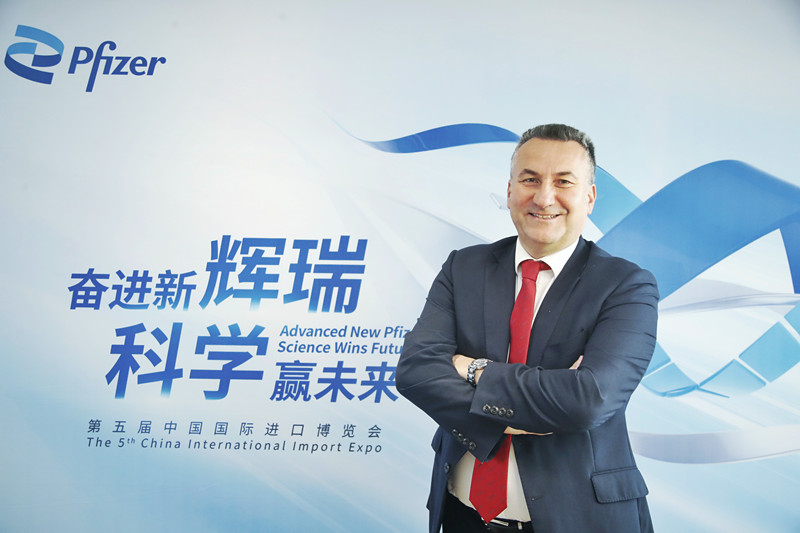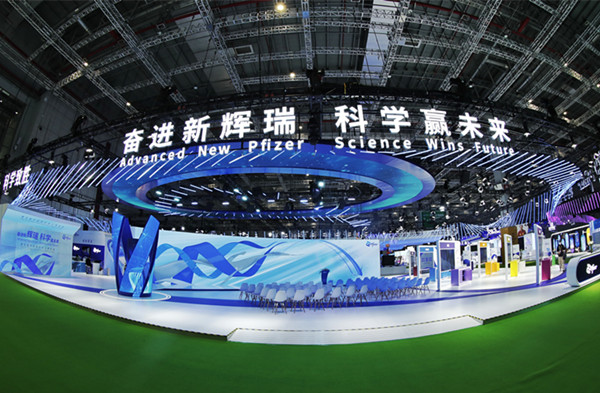Pfizer's top executive optimistic about China's further opening and innovation
- By Zhang Rui
 0 Comment(s)
0 Comment(s) Print
Print E-mail China.org.cn, November 5, 2022
E-mail China.org.cn, November 5, 2022
Jean-Christophe Pointeau, president of Pfizer Biopharmaceuticals Group China, said on Tuesday that he is encouraged by China's prospects, which will also benefit the world.

Pointeau, also chairman of the R&D-based Pharmaceutical Association Committee (RDPAC) of the China Association of Enterprises with Foreign Investment (CAEFI), shared his insights about China's future after the just concluded 20th National Congress of the Communist Party of China (CPC).
"On behalf of 45 RDPAC member companies, I would say the Chinese government is firm in further expanding opening up, which means China will also attract more foreign investments into China. The dual-circulation development pattern will benefit the balanced development of domestic trade and international trade, and benefit the people of China and the world."
"The Chinese government will further encourage innovations … in China, innovation in many industries is at the forefront of the world. However, the pharmaceutical industry still needs to accelerate innovation to promote more innovative Chinese drugs to go abroad. As a foreign-funded pharmaceutical enterprise, Pfizer will also actively cooperate with local enterprises to learn from each other and share knowledge and expertise. This is consistent with Pfizer's goal. In a word, the 20th CPC National Congress is inspiring. China's economy plays a very important leading role in the world, which has injected a strong impetus for the stability of the global economy."
The top executive said he had great confidence in the Chinese market and regarded the country as one of the most important markets for Pfizer. He said the company will actively cooperate with the Chinese government to introduce more global leading innovative products to China, benefit more Chinese people, and fully support the early realization of the Healthy China 2030 initiative.
Pfizer will again participate in the ongoing fifth China International Import Expo (CIIE) from Nov. 5-10 in Shanghai, with one of the largest booths covering 1,000 square meters. Pointeau shared that this time the company will exhibit over 20 innovations and medical solutions, covering five major therapeutic fields: tumors, vaccines, anti-infection, inflammation and immunity, and rare diseases. The most anticipated products are COVID-19 antiviral Paxlovid and Rimegepant, the world's first calcitonin gene-related peptide (CGRP) receptor antagonist available in the form of orally disintegrating tablets.

"As of July 2022, Pfizer has 104 R&D projects in the world, which are undoubtedly 104 potential opportunities to change the lives of patients in the world, including Chinese patients. In fact, in 2022 alone, as many as 11 new products or indications from Pfizer have been approved in China, and we are winning more hope for Chinese patients at the rate of one new medicine per month," he noted.
Since entering the Chinese market more than 30 years, Pfizer has introduced more than 60 innovative drugs, including original research drugs and vaccines, to China. By 2025, Pfizer will introduce 25 more products, indications and dosage forms to China to meet the health needs of Chinese patients.
Pfizer also brings R&D technology and its innovative vision to China to help local R&D development. As early as 2020, Pfizer put forward a strategy aiming to enable China to participate deeply in Pfizer's global R&D process as soon as possible, especially the early clinical research projects, so that Chinese patients can obtain Pfizer's breakthrough innovative treatments as quickly as possible.
He mentioned that Pfizer also explores the digital innovation cooperation model, which "changes the way we interact with patients and doctors," provides digital solutions, converts to virtual interaction channels, and accelerates the construction of the internet medical ecosystem. At this CIIE, several patient care projects will be officially launched to provide patients with management and services.
He added that Pfizer actively responded to the national call for rural vitalization, cultivated a broad market in the counties and deployed a full-time county team of more than 550 people to strengthen grassroots service capacity. In addition, Pfizer actively explored the digital innovation model for county hospitals.
"China is a vast country with uneven distribution of medical resources. First-tier cities are rich in medical resources, while counties are relatively scarce in medical resources. Pfizer hopes to help more Chinese patients enjoy the same normative and standardized diagnosis and treatment in the future," he stressed.
Pointeau, self-described as a French person with a deep love for China, said Pfizer has participated in the CIIE every year and will do so in the future. He believes the CIIE is an open platform and a grand globalization event. "It is a very valuable opportunity for Pfizer."
"China is the second largest economy in the world. During the past 11 years of working in China, I have deeply felt the speed of China's transformation," he elaborated. "In 2011, for the medical industry, the registration of new drugs in China was relatively slow. In recent years, thanks to the government's encouraging innovation policy reform, the registration speed of innovative drugs in China has kept pace with that of the U.S. and Europe … The health care reform and wide coverage of medical insurance not only benefit foreign pharmaceutical enterprises, including Pfizer and strengthen their confidence in getting rooted in the Chinese market, but also greatly benefit the development of China's pharmaceutical industry and Chinese patients."






Go to Forum >>0 Comment(s)